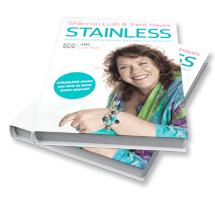Although I had followed this precept since my first few months after my father died, I had never really committed it to paper until a discussion with Martin Walsh. I will expand on this below, but the gem of this axiom is that it works in any situation…
If you are feeling anxious about something (let’s call your anxiety level a 6 on the anxiety Richter Scale)it can feel like there is no way around it – that it is impossible to beat.
If you can raise your confidence level about the trigger of that anxiety to 7, 8 or 9, then you find that your anxiety actually reduces far below that rating of 6.
OK, so how do I raise my confidence level?
Easy – study what scares you.
If you are afraid of sharks, study them. If standing in front of people to talk to them freaks you out, take a course or read on the subject.
I used to be paranoid about sharks thanks to a certain Spielberg movie. So I started borrowing books (there wasn’t any Internet to speak of) and asking people that held diving experiences with sharks. To further raise my confidence, I decided to learn a skill that was related to a dream I’d had as a child (to be able to go under water like The Man from Atlantis or Captain Nemo) – I learned to SCUBA dive. My exam was to dive with sharks and I did this three times (once in Manly Oceanworld; once in Forster, NSW; a third time by pure coincidence on a night dive)
I came out of the water after the night dive and it dawned on me that I was no longer afraid of sharks!*
Does it work in other situations?
I also teach using the confidence method when I’m showing someone who professes a fear of technology. You need to educate yourself about your fears in order to neuter or de-claw them. But don’t go crazy – you just need to know the basics. I didn’t need to know the mating habits of the Port Jackson Shark or become a marine biologist to overcome my fear of sharks – don’t go overboard.
Baby steps
Build your confidence and then test is with baby steps – small tests of your confidence. I’ve been told that some psychologists have a tendencey to thrust people into extreme situations, show the patient everything is fine to de-claw their fears and feel that’s that. In my experience, if you test a little first, you can guage your tension levels and work out how much more confidence (training) you need before you take it to another step.
Is fear of computers real?
Absolutely! But the key is not to give that fear power. Most times it’s actually a feeling of inadequacy about new technology, an inadequacy that is enhanced by what the TV news shows us as “normal.”
i.e. Young people take to technology like ducks to water.
But before you beat yourself up remember that you took to technology when you were young that your grand parents would have thought was scary and so did they when they were young. The difference is that now we live in a world that has news on demand, so we are surrounded by more and more examples of people who don’t fear technology, which actually enhances our insecurities and therefore anxiety.
See? We’re back to Confidence vs. Anxiety
So now I want you to go out there and learn a little. Test a little. Learn some more. And remember that everyone is different so don’t judge yourself by anyone else. This is your journey.
*I still have a healthy fear of great whites, but that’s because their way of testing what something is is having a ‘nibble’ and a Great White’s nibble will normally result in a lost extremity




Lots of exercise is good for fighting depression. As for anxiety, you need to identify the source then deal with removing the source from your life. 🙂
Can I quote you on my website if I link back to this page?